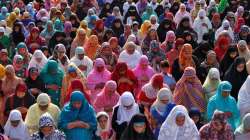In a first, Lucknow mosque to allow women to offer prayers for Eid
Lucknow: At a time when there are persistent controversies over women being disallowed to enter into places of religious worship, Lucknow's famous Eidgah Aishbagh has taken the lead to allow women to read the Eid-ul-Fitr

Lucknow: At a time when there are persistent controversies over women being disallowed to enter into places of religious worship, Lucknow's famous Eidgah Aishbagh has taken the lead to allow women to read the Eid-ul-Fitr namaz for the first time in its history.
The city’s mosque will have a special section for the women to offer prayers on Thursday morning.
Former National Commission for Women (NCW) member Shamina Shafiq has welcomed the decision saying that the inclusion of women into the mainstream plays a crucial role in bringing social equality.
“I think it is a welcome move. A big gratitude to Muslim religious leader Maulana Khalid Rasheed Firangi Mahali for giving women this authority to come out and offer namaz. I would like to him for at least he has started something where women will get same right. I think every mosque should adopt this. It is a very welcome step,” Shafiq said.
Requesting people to join in the namaz she said, “I would also request people to participate in huge numbers tomorrow to offer Namaz so that others too get courage.”
The move comes at a time when various women’s organisations are demanding equal rights on access to places of worship. Instances of women being denied entry to Haji Ali Durgah and sanctum sanctorum at Shani temple in Maharashtra are some recent examples.
The Haji Ali dargah of the 15th century Sufi saint is built on a tiny rocky islet around 500 metres from the Mumbai shoreline at Worli, accessed by a narrow pathway. The women activists have said if the court verdict is in their favour, they would rush to offer prayers at the famous pilgrim site. The trustees, on the other hand, have maintained that permitting women up to the grave of the saint would be "anti-Islamic" and claimed immunity as it was a "minority trust".